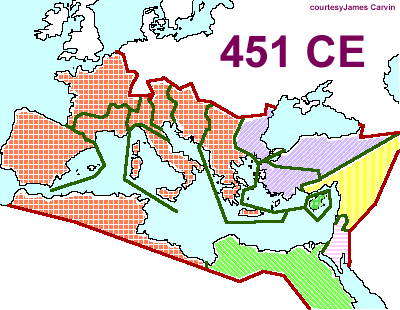 |
|||||||||||||||||||
|
|||||||||||||||||||
Ecc514 - Orthodox Ukrainian jurisdictions |
|||||||||||||||||||
Lesson 1: Early Church Jurisdictions - 6
Both Mark and Barnabas were Levites having roots on the island of Cyprus (Acts 4:26). Levites may have had a less effective mediation between God and man, but they did appreciate the law. And the law is a teacher (Gal3:24). They were men of God. And they were leaders in Israel. And knowing how the New Covenant had fulfilled the Old, they were much more equipped to explain and hand on the faith accurately than were the commoners of the land. Much in the same way that Paul set up a Christian teaching center in the house of Tyrannus in Ephasus (Acts 19:9), by 190 C.E. was formed the Didascalia, a teaching center in Alexandria founded by Pantaenus and made famous by Clement, who is often accused of perverting Christian doctrine with Greek philosophy, and Origen, who is often criticized for allegorizing the scriptures too much. But before we get too critical let us remember that Origen loved the word of God so much that he compiled six separate translations in an interlinear fashion. His interlinear translation, known as the Hexapla, was destroyed by the Muslims in the 7ths Century, along with all of the other works of this great library. But so great was his love of the Bible that if all copies of it were lost everywhere else in the world we might be able to reconstruct it from the works of Origen alone. Suffice it to say that the church thrived in Alexandria. So dominant was the growth and missionary wisdom stemming from this great city that even the term "pope" was used to describe the leader of the bishops there. In fact, the use of this word predates any surviving reference to a "pope" in Rome. The word "pope" simply means "father." The word "father" is not so much to be avoided (as per Mt23:9) as respected. Paul referred to himself as "father" in the sense in which the term "pope" would have ideally applied. "For if you were to have countless tutors in Christ, yet you would not have many fathers, for in Christ Jesus I became your father through the gospel" (1Cor4:15).
|
|||||||||||||||||||
|
|||||||||||||||||||
 Not long after Antioch became a spiritual center, Alexandria was also blessed with the faith. Christianity spread wherever travel was easiest and people gathered so naturally Alexandria took a central role. The great Appollos, mentioned by Paul, was from Alexandria (Acts18:24), and had heard the teaching of John the Baptist.
Not long after Antioch became a spiritual center, Alexandria was also blessed with the faith. Christianity spread wherever travel was easiest and people gathered so naturally Alexandria took a central role. The great Appollos, mentioned by Paul, was from Alexandria (Acts18:24), and had heard the teaching of John the Baptist.